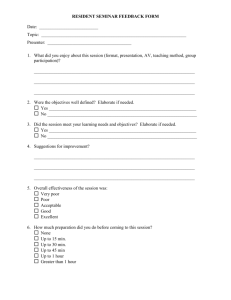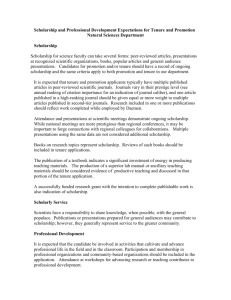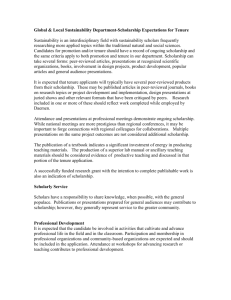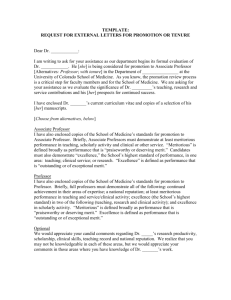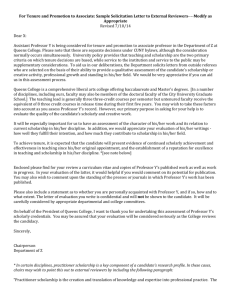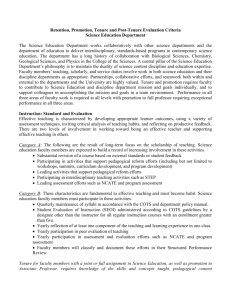PAT Supplemental Guidelines
advertisement
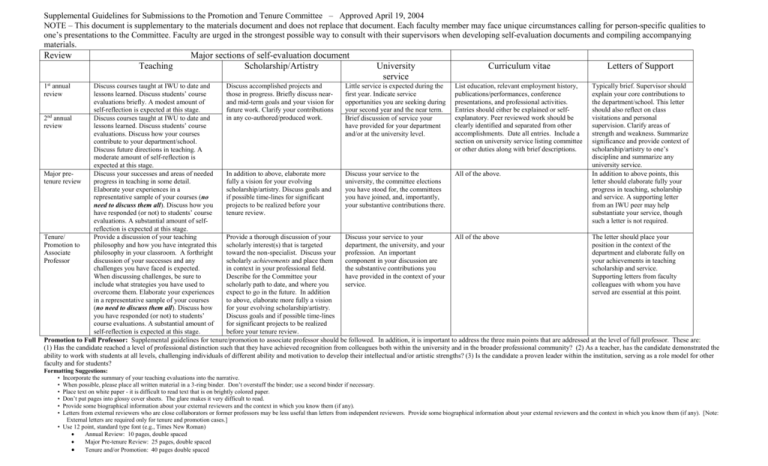
Supplemental Guidelines for Submissions to the Promotion and Tenure Committee – Approved April 19, 2004 NOTE – This document is supplementary to the materials document and does not replace that document. Each faculty member may face unique circumstances calling for person-specific qualities to one’s presentations to the Committee. Faculty are urged in the strongest possible way to consult with their supervisors when developing self-evaluation documents and compiling accompanying materials. Review Teaching Major sections of self-evaluation document Scholarship/Artistry University service Curriculum vitae Letters of Support 1st annual review Discuss courses taught at IWU to date and Discuss accomplished projects and Little service is expected during the List education, relevant employment history, Typically brief. Supervisor should lessons learned. Discuss students’ course those in progress. Briefly discuss nearfirst year. Indicate service publications/performances, conference explain your core contributions to evaluations briefly. A modest amount of and mid-term goals and your vision for opportunities you are seeking during presentations, and professional activities. the department/school. This letter self-reflection is expected at this stage. future work. Clarify your contributions your second year and the near term. Entries should either be explained or selfshould also reflect on class in any co-authored/produced work. explanatory. Peer reviewed work should be visitations and personal 2nd annual Discuss courses taught at IWU to date and Brief discussion of service your clearly identified and separated from other supervision. Clarify areas of review lessons learned. Discuss students’ course have provided for your department accomplishments. Date all entries. Include a strength and weakness. Summarize evaluations. Discuss how your courses and/or at the university level. section on university service listing committee significance and provide context of contribute to your department/school. or other duties along with brief descriptions. scholarship/artistry to one’s Discuss future directions in teaching. A discipline and summarize any moderate amount of self-reflection is university service. expected at this stage. Major preDiscuss your successes and areas of needed In addition to above, elaborate more Discuss your service to the All of the above. In addition to above points, this tenure review progress in teaching in some detail. fully a vision for your evolving university, the committee elections letter should elaborate fully your Elaborate your experiences in a scholarship/artistry. Discuss goals and you have stood for, the committees progress in teaching, scholarship representative sample of your courses (no if possible time-lines for significant you have joined, and, importantly, and service. A supporting letter need to discuss them all). Discuss how you projects to be realized before your your substantive contributions there. from an IWU peer may help have responded (or not) to students’ course tenure review. substantiate your service, though evaluations. A substantial amount of selfsuch a letter is not required. reflection is expected at this stage. Tenure/ Provide a discussion of your teaching Provide a thorough discussion of your Discuss your service to your All of the above The letter should place your Promotion to philosophy and how you have integrated this scholarly interest(s) that is targeted department, the university, and your position in the context of the Associate philosophy in your classroom. A forthright toward the non-specialist. Discuss your profession. An important department and elaborate fully on Professor discussion of your successes and any scholarly achievements and place them component in your discussion are your achievements in teaching challenges you have faced is expected. in context in your professional field. the substantive contributions you scholarship and service. When discussing challenges, be sure to Describe for the Committee your have provided in the context of your Supporting letters from faculty include what strategies you have used to scholarly path to date, and where you service. colleagues with whom you have overcome them. Elaborate your experiences expect to go in the future. In addition served are essential at this point. in a representative sample of your courses to above, elaborate more fully a vision (no need to discuss them all). Discuss how for your evolving scholarship/artistry. you have responded (or not) to students’ Discuss goals and if possible time-lines course evaluations. A substantial amount of for significant projects to be realized self-reflection is expected at this stage. before your tenure review. Promotion to Full Professor: Supplemental guidelines for tenure/promotion to associate professor should be followed. In addition, it is important to address the three main points that are addressed at the level of full professor. These are: (1) Has the candidate reached a level of professional distinction such that they have achieved recognition from colleagues both within the university and in the broader professional community? (2) As a teacher, has the candidate demonstrated the ability to work with students at all levels, challenging individuals of different ability and motivation to develop their intellectual and/or artistic strengths? (3) Is the candidate a proven leader within the institution, serving as a role model for other faculty and for students? Formatting Suggestions: • Incorporate the summary of your teaching evaluations into the narrative. • When possible, please place all written material in a 3-ring binder. Don’t overstuff the binder; use a second binder if necessary. • Place text on white paper - it is difficult to read text that is on brightly colored paper. • Don’t put pages into glossy cover sheets. The glare makes it very difficult to read. • Provide some biographical information about your external reviewers and the context in which you know them (if any). • Letters from external reviewers who are close collaborators or former professors may be less useful than letters from independent reviewers. Provide some biographical information about your external reviewers and the context in which you know them (if any). [Note: External letters are required only for tenure and promotion cases.] • Use 12 point, standard type font (e.g., Times New Roman) Annual Review: 10 pages, double spaced Major Pre-tenure Review: 25 pages, double spaced Tenure and/or Promotion: 40 pages double spaced
